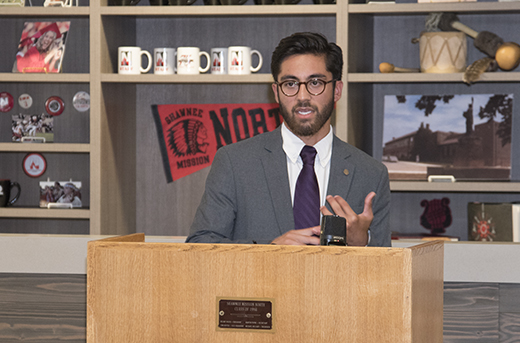College placement program for Johnson, Wyandotte counties unveiled at recent event
Friday, Sept. 2, 2016

Mario Garcia III, a junior in family studies and human services and alumnus of Shawnee Mission North High School, speaks to audience members about being a first-generation college student at Kansas State University.
OLATHE — Establishing a pathway for first-generation college students to enter a university was the focus of a recent launch event by Kansas State University Olathe and Shawnee Mission North High School.
The Aug. 23 event spotlighted the Kansas State College Advising Corps, a best fit college and university access program for low-income, underrepresented and first-generation college students in Johnson and Wyandotte counties. Six advisers with the corps help students navigate university enrollment and scholarship programs — processes that are often foreign to first-generation college students and families.
Faculty, administrators, recruiters, students and parents from the Olathe, Shawnee Mission and Turner School Districts, as well as the Shawnee Mission North High School Navy Junior Reserve Officers' Training Corps and local media, turned out to listen to the speaker panel at Shawnee Mission North High School.
The speaker panel opened with Jim Hinson, superintendent for the Shawnee Mission School District. Hinson helped introduce a college advising corps program in Missouri, on which the Kansas system is modeled. The Kansas program is part of the national College Advising Corps.
Hinson was followed by Kansas State University speakers, including Gen. Richard Meyers, interim university president and an alumnus of Shawnee Mission High School; Pat Bosco, vice president for student life, dean of students and a first-generation college student; Mario Garcia III, a junior in family studies and human services, first-generation college student and alumnus of Shawnee Mission North High School; and Bernard Franklin, assistant vice president for student life, executive director of the Kansas State College Advising Corps and director of university programs for the Shawnee Mission School District.
"This program is simple," Bosco said. "We're interested in making sure that no one falls through the cracks, particularly first generation students. I was a first generation student in Syracuse, New York, and I went to a public school and fell through the cracks because I did not have an adviser and the support I needed to be successful. We're not going to repeat that for these students."
The program, which recently began its pilot year, will benefit more than 10,000 students currently enrolled in Olathe East and North high schools; Shawnee Mission North, South and West high schools; and Turner High School. These schools have a significant population of students who quality for free and reduced lunch or are forecasted to have a significant ethnic and income shift in the coming years.
The U.S. Census Bureau projects a significant shift in the nation's demographics by 2050, at which time black, Hispanic and Asian populations will comprise half of the U.S. population while the number of white households will decrease.
As this population increases, college access rates for low-income and underrepresented students needs to increase as well, Gen. Meyers said. Historically, individuals in these demographics are often the first generation to go to college in their family and are unfamiliar with navigating the complex higher education enrollment and scholarship processes.
Educating this growing population also presents opportunities for the workforce in greater Kansas City. The Mid-American Regional Council states that 34 percent of adults older than age 25 in the greater Kansas City region have at least a bachelor's degree. In the last 10 years, however, 40 percent of new jobs created in the Kansas City region required a bachelor's degree.
"If the region is going to grow, then education and talent are important," Gen. Meyers said. "The workforce needs of greater Kansas City tie directly into this program and underscore why Kansas State University, a land-grant university, is involved in providing increased access to higher education for Kansas students and ensuring the region's continued growth and success."
The program is funded by Kauffman Foundation, AmeriCorps, the National Academic Advising Association, the College Advising Corps, Kansas State University and the Shawnee Mission School District.
For more information about the Kansas State College Advising Corps, visit k-state.edu/kscac.